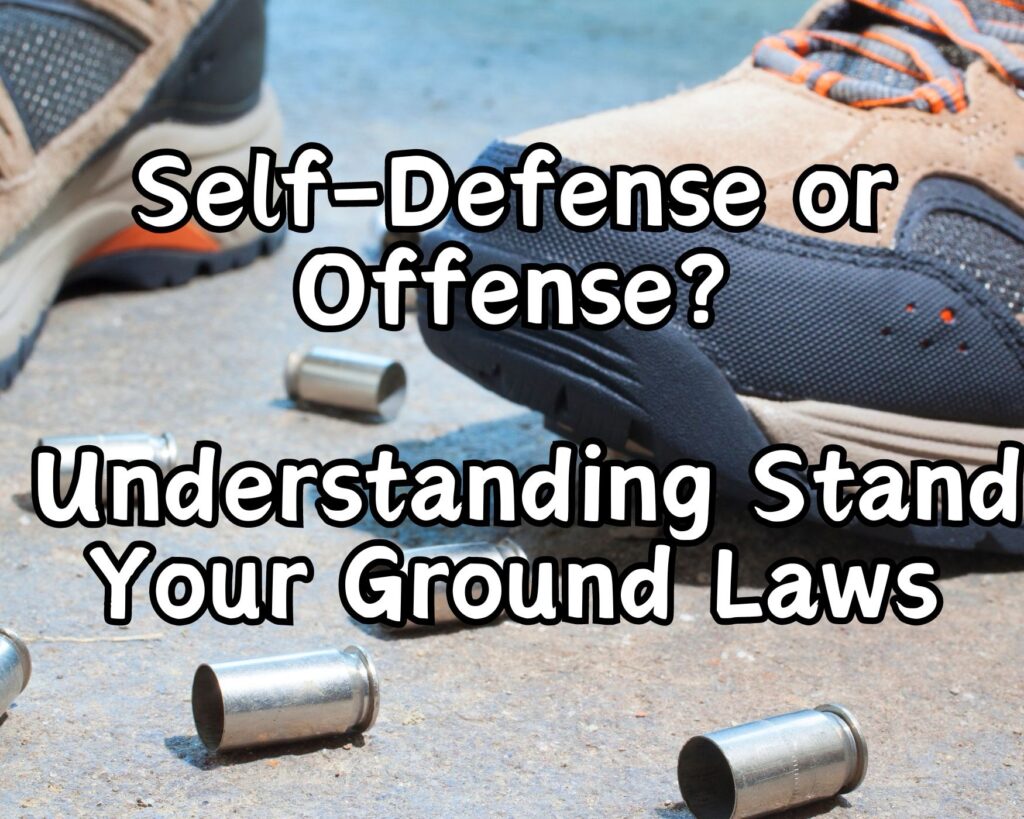In the intricate tapestry of American jurisprudence, “stand your ground” laws stand out as a contentious and often misunderstood element. At their core, these laws embody the principle that individuals have the right to use force, including lethal force, in self-defense without the duty to retreat when faced with a perceived threat. While rooted in the fundamental right to protect oneself, the application of these laws across various states has sparked a national debate, blurring the lines between self-defense and undue aggression.

This article, “Self-Defense or Offense? Understanding Stand Your Ground Laws,” aims to demystify these laws, offering a balanced examination of their origins, implications, and the ethical considerations they invoke. As we navigate through real-life cases, legal frameworks, and expert analyses, we seek to provide readers with a comprehensive understanding of how these laws function within the broader legal system and the societal impacts they bear.
The discussion of “stand your ground” laws is not merely an academic exercise but a crucial conversation about the nature of justice, the boundaries of personal safety, and the societal values that inform our legal rights and responsibilities. Through this exploration, we invite readers to consider the delicate balance between ensuring one’s safety and fostering a just and equitable society.
As we delve into the complexities of “stand your ground” laws, we strive to offer clarity on a subject that continues to challenge legal scholars, policymakers, and citizens alike. Whether you’re a legal professional, a concerned citizen, or simply seeking to understand the nuances of your rights, this article aims to equip you with the knowledge and perspectives necessary to navigate the intricate landscape of self-defense laws in America.
The Legal Foundation of Stand Your Ground Laws

“Stand your ground” laws have become a significant facet of American self-defense legislation, offering individuals the right to protect themselves against perceived threats without the obligation to retreat. Rooted in the ancient legal principle that “a man’s home is his castle,” these laws have evolved to encompass situations beyond the home, reflecting a broader interpretation of self-defense rights.
Origins and Evolution
The concept of standing one’s ground is not new; it is deeply ingrained in the legal traditions of many societies. In the United States, the principle has been codified into law in several states, drawing from the English common law’s Castle Doctrine, which allows individuals to use reasonable force to defend their home from an intruder. Over time, “stand your ground” laws have expanded this principle, applying it to situations outside the home where a person lawfully occupies space, such as in a vehicle or public place.
For a deeper dive into the evolution of these laws and their importance in the realm of home defense, the article “Stand Your Ground: The Importance of Home Defense in Protecting Your Loved Ones” provides valuable insights, highlighting the crucial balance between upholding safety and navigating the legal responsibilities that come with the right to self-defense.
State-by-State Variations
“Stand your ground” laws vary significantly from one state to another, reflecting diverse legislative approaches to self-defense. While some states have explicit “stand your ground” statutes, others incorporate the principle through case law or broader interpretations of self-defense rights. This variability underscores the importance for residents to familiarize themselves with the specific laws and legal precedents that govern self-defense actions in their state.
Legal Criteria for “Stand Your Ground”
To invoke “stand your ground” as a defense in legal proceedings, certain criteria must typically be met:
- The individual must genuinely believe that they are in imminent danger of bodily harm or death.
- The force used in defense must be proportional to the threat faced.
- The individual must be in a place where they have a right to be and not engaged in illegal activity.
Understanding these criteria is essential for responsibly exercising one’s self-defense rights under “stand your ground” laws, ensuring that actions taken in the heat of the moment align with legal standards and protections.
How Stand Your Ground Laws Work
“Stand your ground” laws provide a legal framework for individuals to defend themselves or others from threats or perceived threats without the requirement to retreat. These laws are built on the premise that individuals have the right to feel safe and protect themselves in places where they are lawfully present. However, the application of these laws is subject to specific criteria and circumstances.
Criteria for Invoking Stand Your Ground
- Lawful Presence: The individual claiming self-defense must be in a location where they have the right to be.
- Immediate Threat: There must be a reasonable belief of imminent danger of bodily harm or death.
- Proportionate Response: The force used in self-defense must be proportional to the threat encountered.
Understanding these criteria is crucial for responsibly exercising one’s rights under “stand your ground” laws. It underscores the importance of not only knowing the law but also preparing oneself mentally and spiritually for the possibility of having to make such grave decisions.
Faith and Self-Defense
For many, the principles guiding decisions about home defense are deeply rooted in personal faith. This faith not only provides moral guidance but can also offer comfort and strength in difficult situations. Items that embody one’s faith, such as the “Get Right With Jesus Custom Personalized Sign” from Weaver Custom Engravings, serve as powerful reminders of these guiding principles. Such a sign can symbolize the intersection of faith and the right to defend one’s home, suggesting that protecting one’s family is not just a legal right but also a spiritual duty.
Legal Implications and Responsibilities
Invoking “stand your ground” in self-defense situations carries significant legal implications. It requires a thorough understanding of both the law and the responsibility that comes with the power to use lethal force. Individuals must be prepared to demonstrate that their actions were justified under the law, often in a court setting.
Navigating Legal Challenges
Those who find themselves in a position to invoke “stand your ground” may face legal scrutiny to determine if the criteria for self-defense were met. This process can be complex, involving detailed examination of the circumstances, witness testimonies, and expert analysis. Legal representation becomes crucial in navigating these challenges, emphasizing the importance of consulting with legal professionals who specialize in self-defense cases.

As we conclude our exploration of stand your ground laws, it’s important to address some common questions that arise when discussing this complex legal terrain. These inquiries often reflect concerns about the practical application of the law, its implications, and how individuals can navigate situations where self-defense may be necessary.
What Does It Mean to Have a ‘Reasonable Belief’ of Threat?
A ‘reasonable belief’ refers to the perception that an average person, in similar circumstances and with a similar background, would hold regarding the threat of imminent harm or death. This standard is subjective, yet it aims to balance individual perceptions with a measure of objectivity. Courts typically consider the specifics of each situation to determine whether the belief was justified.
Are Stand Your Ground Laws the Same in Every State?
No, stand your ground laws vary significantly across the United States. Some states have explicit statutes that do not require individuals to retreat before using force in self-defense, while others may have more restrictive conditions. It’s crucial for residents to familiarize themselves with the laws specific to their state and to understand how these laws apply to different scenarios.
How Do Stand Your Ground Laws Affect Self-Defense Claims?
Stand your ground laws can significantly impact the outcome of self-defense claims by removing the duty to retreat and allowing individuals to use force, including deadly force, if they believe it necessary to prevent harm. This legal protection can be pivotal in cases where the decision to use force is made in split-second circumstances, offering legal ground for individuals to defend themselves or others.
Can Invoking Stand Your Ground Laws Lead to Legal Immunity?
In some cases, yes. Stand your ground laws can provide immunity from prosecution if it’s determined that the use of force was justified under the law. However, claiming this immunity often requires a pre-trial hearing where the defendant must demonstrate that their actions align with the legal criteria for self-defense as outlined in the applicable stand your ground law.
What Should You Do If You Need to Invoke Stand Your Ground?
If you find yourself in a situation where invoking stand your ground is necessary, it’s crucial to:
- Ensure your immediate safety and that of others involved.
- Contact law enforcement as soon as possible to report the incident.
- Seek legal counsel to navigate the ensuing legal process, as self-defense cases can become complex, involving detailed investigations and legal scrutiny.
Closing Thoughts
Understanding stand your ground laws is essential for anyone looking to navigate the responsibilities and rights associated with self-defense. While these laws provide a framework for protecting oneself, they also underscore the importance of prudence, awareness, and a deep respect for the gravity of using force in any situation. As societal values and legal interpretations evolve, so too will the discourse on stand your ground laws, making ongoing education and engagement with these issues critical for all concerned citizens.
As an Amazon Associate we earn from qualifying purchases through some links in our articles.




